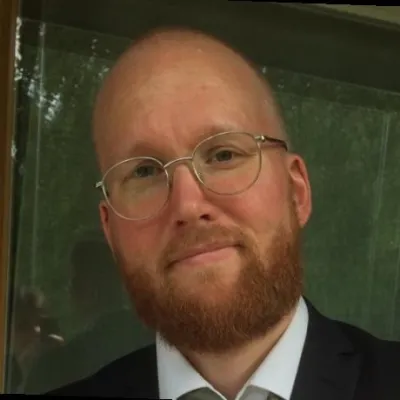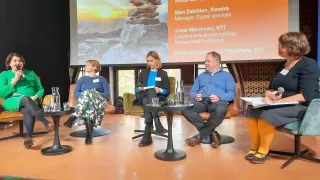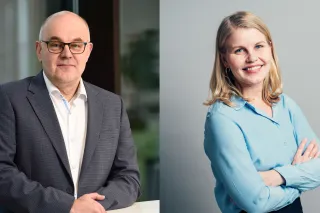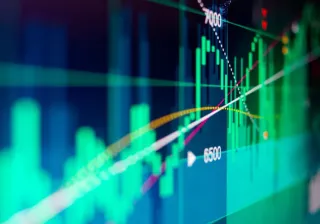“There is no future without responsibility” was said at VTT's Strong, Stronger, Responsible seminar (Vahva, Vahvempi, Vastuullinen) on 19 October 2022 in Tampere, Finland. A lot is packed in this strong message. For some, it can mean that humanity has no future without more responsible courses of action; for others, that society – institutions, structures, culture and people – demands responsibility from commercial operators to the extent that a strong, responsible approach is a precondition for business continuity in the future. Either way, the time for change is at hand. Several key questions and solutions were brought up at the seminar.
Although responsibility is not a novel phenomenon in society, it requires change and therefore leadership to guide through the transformation. The role of social factors and partner management throughout the supply chain are crucial in the formation of responsibility. The seminar participants all agreed that organisations must be able to connect business operations to promoting responsibility. If responsibility remains a disconnected secondary goal, the change is not impactful enough.
Trust is built from openness
From a business perspective, an old truth still holds: trust in achieving a high-quality product and end result is the most important aspect in creating and delivering services and products, forming and sharing knowledge as well as in decision-making and trade.
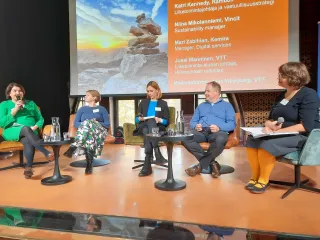
The panel, which featured Maria Zabihian from Kemira, Katri Kennedy from Ramboll, Niina Mikolanniemi from Vincit and Jussi Manninen from VTT, all agreed that companies should be honest and open also about their weaknesses and the journey towards their goals – not just the success. Highlighting weaknesses is a question of honesty and openness, both of which are preconditions for building trust, in addition to high-quality services.
Companies should be honest and open also about their weaknesses and the journey towards their goals – not just the success.
Trust is easier to build if the organisation and its partners are on the same page regarding communication. It was highlighted at the seminar that collaboration will increase in the future, even with competitors. The new regulatory obligations of responsibility will increase communication on responsibility. Working together with other actors can support the fulfilment of communication obligations and harmonize the impact of communication.
Integrating responsibility into all activities
Responsibility is not, however, all about communication, and it is not measured just to confirm that you are acting responsibly. Instead, it should be a key part in all organisational and business activities. In the words of the first keynote speaker of the seminar Oras Tynkkynen from Tyrsky Consulting: “a CEO who doesn’t have responsibility on their agenda shouldn't be a CEO”.
A CEO who doesn’t have responsibility on their agenda shouldn't be a CEO.
The second keynote speaker was Tommi Pettersson, Vice President of Strategy, Sustainability and Technology at Kalmar, whose job description brings together responsibility matters and directing technology strategy. This is an example of leadership where the link between business operations and promoting responsibility is made possible. Based on the leadership model, it can be expected that responsibility is not just a secondary objective.
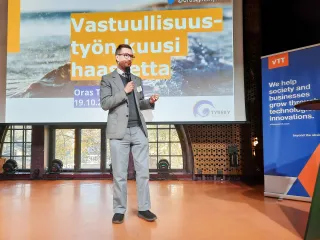
The third keynote speaker, Hanna Kalliomäki, Sustainability Director at Paptic, highlighted the courage to promote responsibility in business activities. The message that echoed through the seminar was that nothing prevents the realisation of responsibility and sustainability – it is just us standing in the way. Sustainable and responsible value creation is possible, but it requires courage. Collaboration and open-mindedness are key requirements for responsible activities.
Responsibility throughout the value chain
The increase in collaboration in responsibility applies to both partners and competitors alike. For example, collaboration can be done through the Kestävän Kehityksen Nyrkki think tank (KeKeNy) presented at the seminar. The goal of KeKeNy is to bring companies and research representatives around the same table to discuss the challenges of responsible, sustainable courses of action, and to create solutions. The activities of KeKeNy are coordinated by VTT, and it is part of the network of the SEEDForest collaboration platform.
In addition to the entire supply chain, it is important to describe issues concretely enough at an organisational level so that every employee understands how their work relates to the common goals. As the chain covers both raw materials and end users, it is critical to perceive possible changes also in the everyday lives of citizens. The importance of the entire chain is highlighted in Kalmari’s example: as the electrification of machinery keeps progressing, the source of electricity used by the end user (fossil-based or renewable) has a larger and larger effect on the carbon balance of the entire chain.
However, more information is required on the chain. In a world where digitalisation is a megatrend, the role of data is already crucial, and it will only increase in the future. While the amount of data keeps growing, collecting data that promotes responsibility is not always easy. A challenge for responsibility data is that it is often only used for reporting, not for guiding decision-making and activities. This might be the key question in promoting responsibility: how can responsibility information and knowledge be utilised in a way that our operations continuously become more responsible?
Responsibility thinking is developing
Responsibility is a complex issue. In addition to the three pillars of sustainable development, environment, society and economy, it also encompasses ethical questions, among other things. The perspectives of diversity and inclusion also need to be acknowledged. It is easy for organisations to shrink responsibility issues to just environmental matters. Today, environmental matters no longer include just climate change but also biodiversity and the decline of nature. Responsibility also covers human rights and well-being at work.
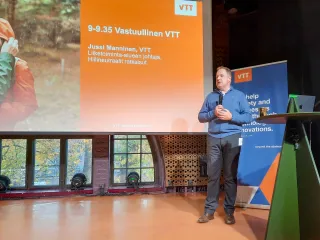
As digitalisation develops and progresses, the on-line utilisation of data becomes more effective, which in turn makes reacting quicker – if we can identify and understand the possibilities of data that determines responsibility. In other words, we should not just measure and report responsibility, or declare it in our strategies, but build dataflows, models and a culture of responsibility within our organisations that helps everyone regardless of their position to act responsibly and to make responsible decisions.
In his opening speech, VTT’s Executive Vice President of Carbon Neutral Solutions Jussi Manninen said that reaching a mathematical optimum in sustainability and responsibility matters is difficult and that compromises are unavoidable. That is not to say that the right directions should not be pursued or that one could not navigate the complexities of responsibility. Mika Nieminen from VTT pointed out how megatrends are lighthouses in times of uncertainty. We must understand and examine our operating environment to find the right direction. At VTT, for example, foresight research, models for sustainable value creation and, of course, new technologies and materials that help us find new solutions are constantly being developed.
The Strong, Stronger, Responsible seminar will be held again next year.
Watch the seminar recording (in Finnish)!

